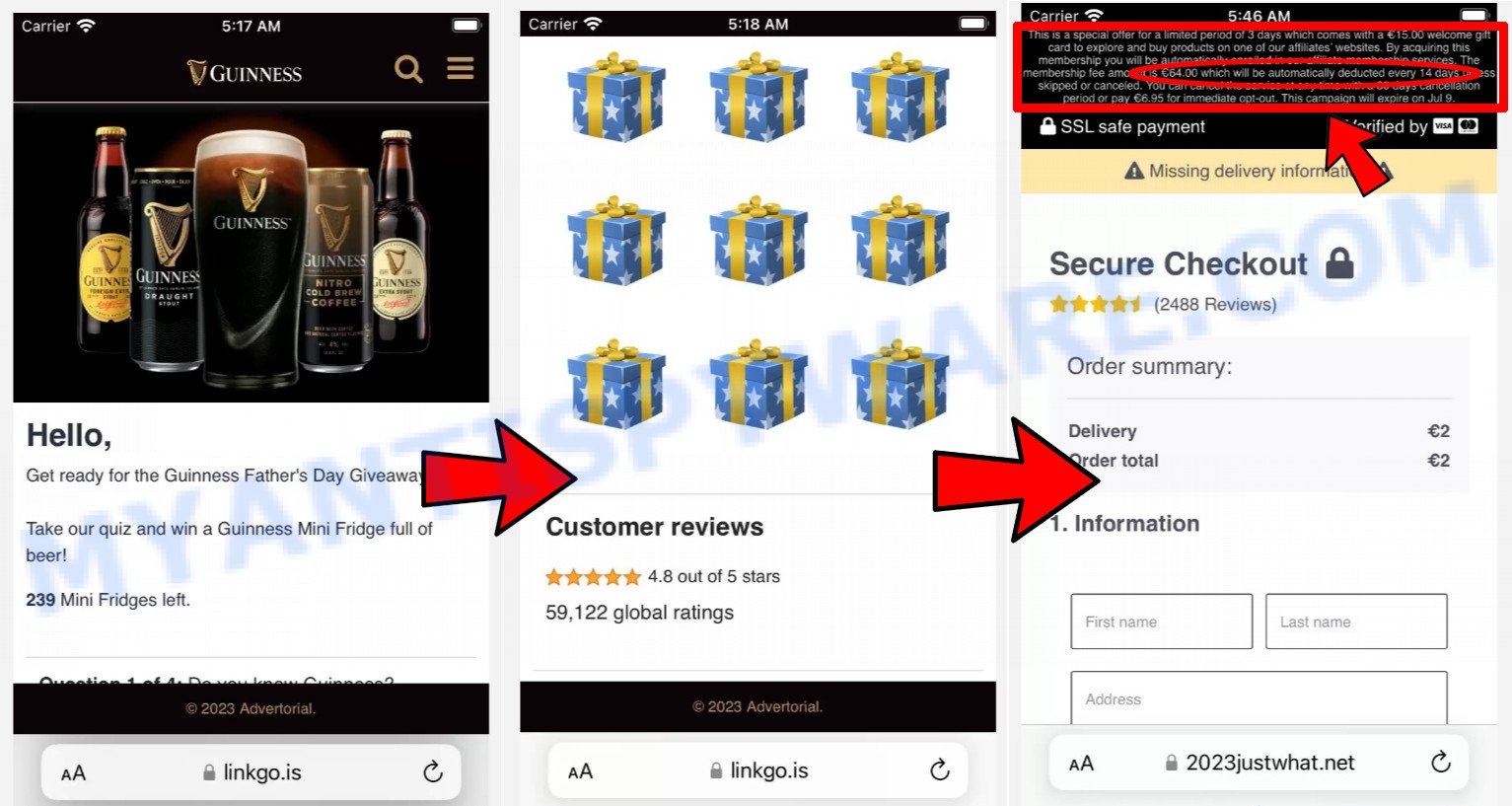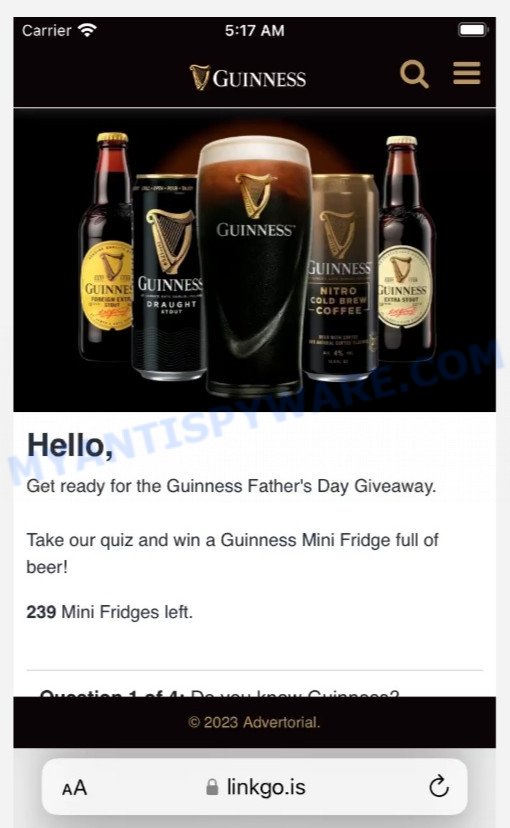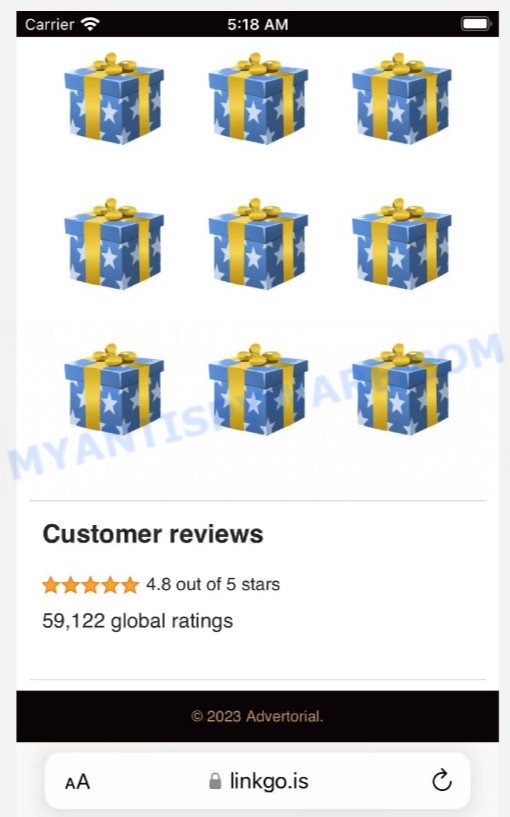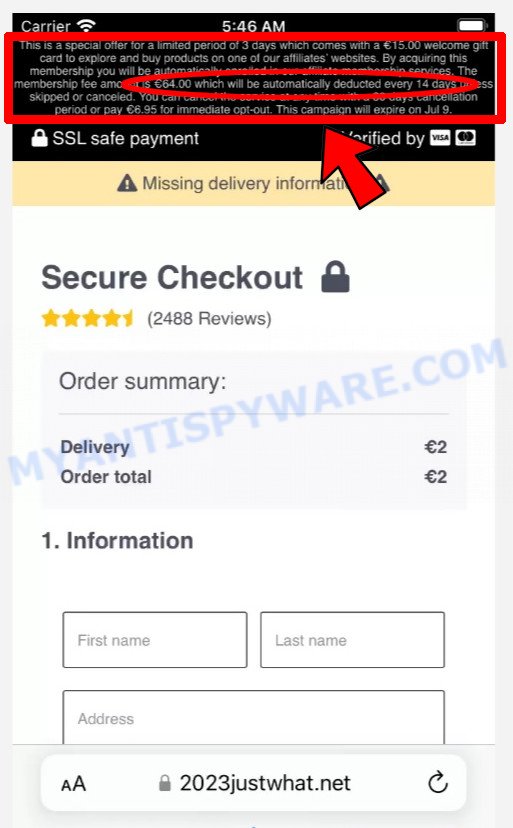Are you excited about Father’s Day and the chance to win a Guinness Mini Fridge full of beer? Beware! A new scam is making its rounds, targeting unsuspecting WhatsApp users with a deceptive offer. Scammers have set up a fake website, linkgo.is, posing as an innocent URL shortener, and are luring people into a trap. They tempt users with a quiz and promise of a fantastic prize, but it’s all a ruse to trick you into subscribing to a paid service without your consent. Don’t let your excitement cloud your judgment.
Read this article to learn more about the Guinness Father’s Day Giveaway scam and discover how to protect yourself and your loved ones from falling victim to such fraudulent schemes. Stay informed and stay safe!

QUICK LINKS
- How the Guinness Father’s Day Giveaway Scam works?
- What to do if you receive a message with a link to the Guinness Giveaway promotion?
- How to Spot and Avoid Such Scams?
How the Guinness Father’s Day Giveaway Scam works?
The Guinness Father’s Day Giveaway scam is a fraudulent scheme that preys on the excitement surrounding Father’s Day celebrations. Scammers use WhatsApp messages and a fake website called linkgo.is to deceive unsuspecting users into believing they have won a desirable prize: a Guinness Mini Fridge filled with beer. However, behind this enticing offer lies a well-orchestrated trap designed to extract personal information and enroll victims in a paid subscription service.
The scam begins with users receiving messages, sometimes from friends or strangers, inviting them to participate in the giveaway. These messages contain a link, such as linkgo.is/AbMhgXir/, which leads users to the scam website. Upon clicking the link, users are directed to a page on linkgo.is that presents an alluring description of the giveaway, complete with details about the prize and the limited number of remaining mini fridges.

To create an illusion of legitimacy, users are then asked to answer a series of simple questions, making them feel actively involved in the quiz-like process. After completing the questions, users are directed to a page congratulating them on their successful participation. They are then prompted to play a game where they must select a box containing a gift. Remarkably, regardless of the choice made on the second attempt, the scammers always declare the user as a winner of the coveted Guinness Mini Fridge.

At this point, the scam takes a malicious turn. Users are instructed to share the promotion with 5 WhatsApp groups or 20 friends, ensuring the scam spreads further. Once this requirement is met, users are taken to a form where they are asked to provide their delivery address. However, the true intent of the scammers becomes evident in the subsequent step, where victims are misled into entering their payment details under the guise of covering delivery charges for their prize.

Little do the unsuspecting victims know that by submitting their payment information, they are unknowingly subscribing to a paid membership service. The scammers exploit users’ excitement and trust, trapping them in a recurring payment cycle without their consent.
The Guinness Father’s Day Giveaway scam operates with the sole intention of duping users into unwittingly subscribing to a paid service under the guise of claiming their prize. It exploits individuals’ excitement, trust, and desire to celebrate Father’s Day. To protect yourself and others from falling victim to this fraudulent scheme, it is crucial to remain vigilant, recognize the red flags, and avoid sharing personal information or providing payment details on suspicious websites.
Examples of such scams
Scammers are constantly evolving their tactics to exploit unsuspecting individuals, and the Guinness Father’s Day Giveaway scam is just one example of their deceptive schemes. However, it’s important to note that this particular scam is not an isolated incident. Similar fraudulent activities have been targeting people using various disguises and enticing offers.
Here are some examples of similar scams that bear resemblance to the Guinness Father’s Day Giveaway scam, highlighting the diversity of their approaches and the need for heightened awareness: Mr Beast Giveaway SCAM, Gordon Ramsay HexClad Cookware Giveaway Scam, and Amazon Mother’s Day Giveaway Scam. By familiarizing ourselves with these examples, we can better protect ourselves and others from falling victim to such deceitful practices.
- Gordon Ramsay HexClad Cookware Giveaway Scam
- Elon Musk GiveAway Marathon Crypto Scam
- Amazon Mother Day Giveaway Scam
- Mr Beast Giveaway Scam YouTube 25 No ClickBait Giveaway
- Amazon Childrens Day PlayStation 5 Giveaway Scam
What to do if you receive a WhatsApp message or social media post with a link to the Guinness Giveaway promotion
If you receive a WhatsApp message or social media post with a link to the Guinness Father’s Day Giveaway, there are several steps you can take to protect yourself:
- The first and most important step is to avoid clicking on the link. This can help prevent you from being directed to a fake website or downloading harmful software.
- If you are interested in participating in the promotion, it is recommended to verify the legitimacy of the promotion by checking the official Guinness website or social media channels. Legitimate promotions are usually advertised on the company’s official channels, so if you cannot find any information about the promotion there, it is likely a scam.
- If you suspect that the message is a scam, report it to the relevant authorities. For WhatsApp, you can report the message by tapping and holding on the message and selecting “Report” from the menu. For other social media platforms, look for a “Report” or “Flag” option.
- If you receive a suspicious message, it is important to warn your contacts about the scam to prevent them from falling victim to it. You can do this by forwarding the message to your contacts and explaining why you believe it is a scam.
- Never provide personal information, such as your address, phone number, or credit card details, in response to a suspicious message or website. Legitimate companies would never ask for this information in this way.
By following these steps, you can help protect yourself and others from falling victim to the Guinness Giveaway scam and other similar scams.
Threat Summary
| Name | Guinness Father’s Day Giveaway Scam |
| Type | Phishing Scam |
| Fake claims | Offering a Guinness Mini Fridge as a prize for Father’s Day |
| Scammers websites | linkgo.is (fake URL shortener) |
| Disguise | Fake Guinness branding and holiday theme |
| Symptoms | Unsolicited WhatsApp messages inviting users to participate; False promises of winning the prize |
| Damage | Financial loss, Unauthorized subscription |
| Distribution | WhatsApp messages and social media |
| Target Audience | Anyone on WhatsApp |
| Prevention Tips | 1) Do not click on suspicious links; 2) Verify the legitimacy of the promotion through official channels; 3) Warn your contacts about the scam; 4) Protect your personal information |
| Reporting Info | Report suspicious messages to WhatsApp by tapping and holding the message and selecting “Report” |
How to spot and avoid such scams?

Here are some tips on how to spot and avoid scams like the Guinness Father’s Day Giveaway Scam:
- Be wary of unsolicited messages. If you receive a message or email from an unknown sender, be cautious. Do not click on any links or download any attachments until you have verified that the sender is legitimate.
- Look out for spelling and grammatical errors. Scammers often use poor spelling and grammar, which can be a red flag. Legitimate companies usually have a team of professional writers who proofread their communications.
- Check the website address. Before you enter any personal information or payment details, make sure you are on a legitimate website. Check the URL to see if it matches the company’s official website.
- Verify Suspicious Links with Online Scanners. Use online services such as VirusTotal or URLScan.io to scan the suspicious link before clicking on it. To do this, copy the URL of the suspicious link and paste it into the search bar of the VirusTotal or URLScan.io website.
- Don’t give out personal information. Be cautious about giving out personal information, such as your name, address, phone number, or email address. Legitimate companies will not ask for this information unless it is necessary to complete a transaction.
- Be suspicious of offers that seem too good to be true. Scammers often use enticing offers to lure people in. If an offer seems too good to be true, it probably is.
By following these tips, you can reduce your risk of falling victim to scams like the Guinness Father’s Day Giveaway Scam. If you suspect that you have been targeted by a scam, report it to the relevant authorities immediately.
Conclusion
In conclusion, the Guinness Father’s Day Giveaway scam and similar online scams continue to exploit unsuspecting individuals in their pursuit of valuable prizes, such as the enticing Guinness Mini Fridge. These scams rely on our excitement and trust, often reaching us through platforms like WhatsApp.
To protect ourselves, it is essential to exercise caution and skepticism when encountering unsolicited messages with lucrative offers. Be wary of clicking on unfamiliar links and always verify the authenticity of promotions through trusted sources. By staying informed and adopting proactive security measures, we can reduce the risk of falling victim to these deceptive tactics.
Remember that reporting such scams is crucial. By alerting the relevant authorities and reporting incidents to WhatsApp and online fraud platforms, we can contribute to the fight against cybercrime and protect others from becoming victims. Together, we can create a safer online environment and minimize the impact of scams, ensuring that our digital experiences remain enjoyable and secure.





















